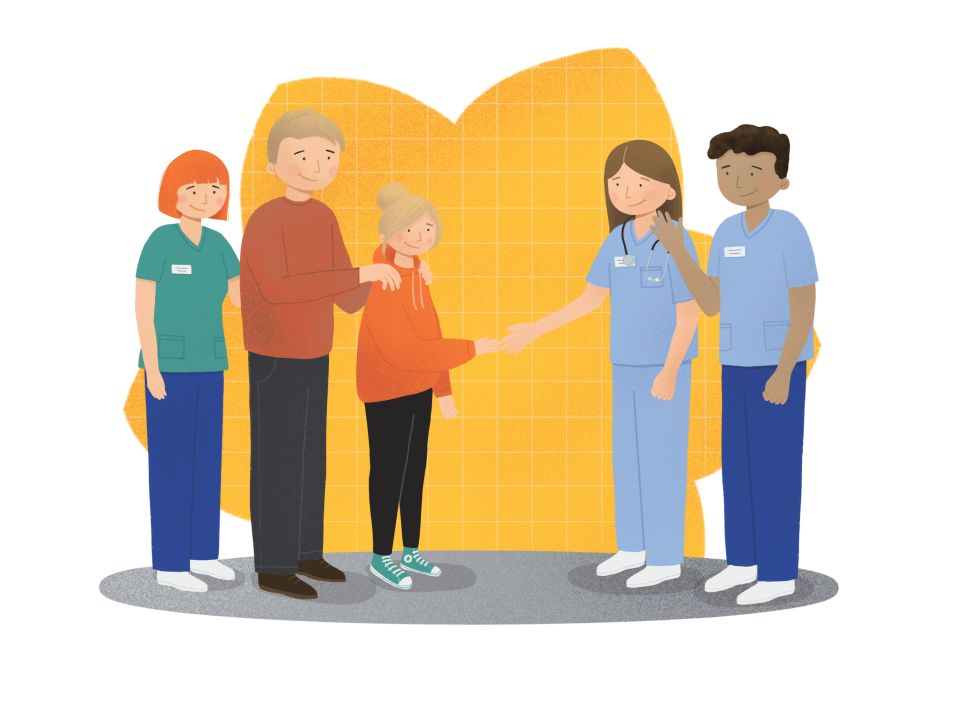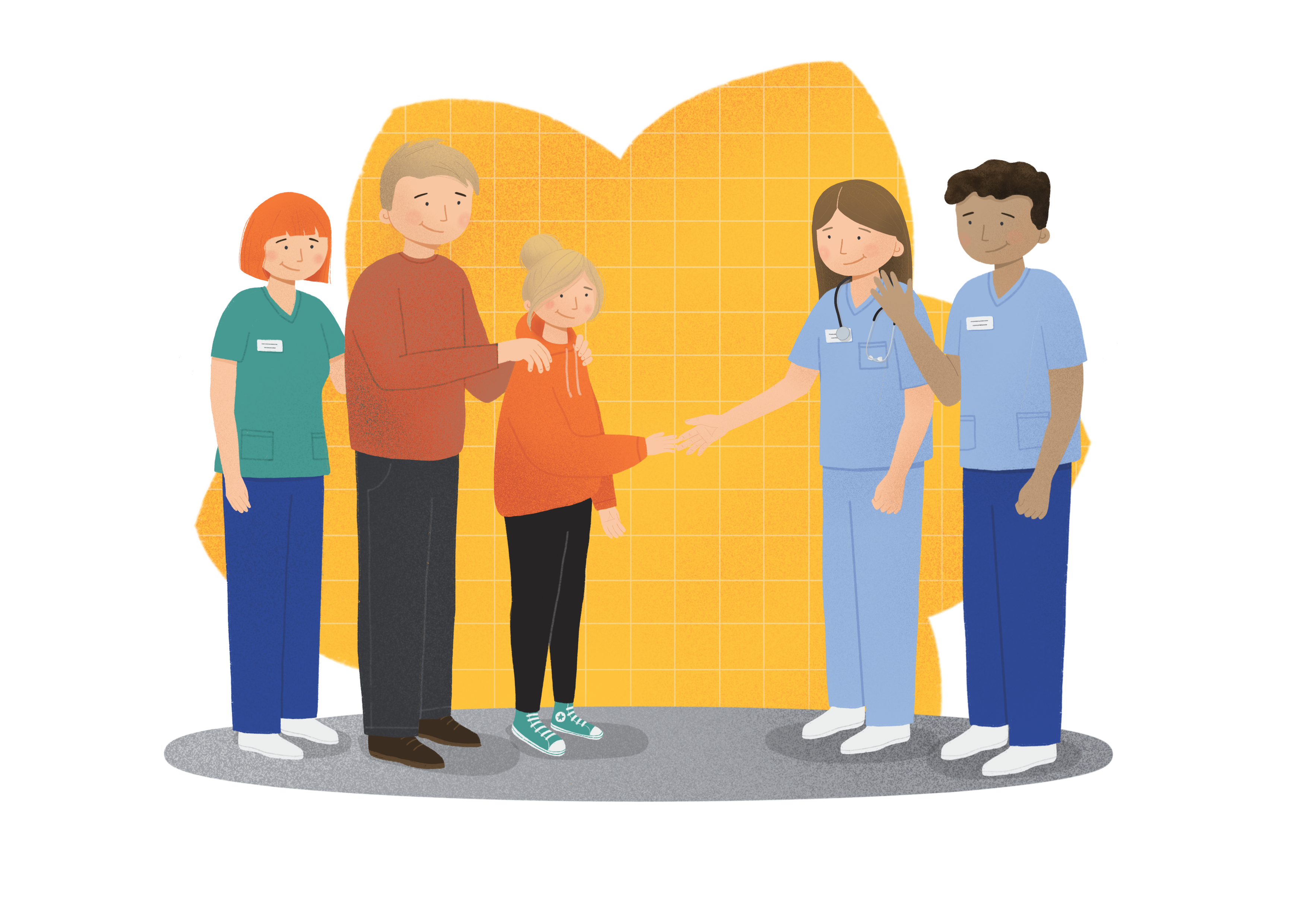Life during treatment

Your child’s whole routine is likely to change during treatment:
- They are likely to have regular hospital appointments, which may involve a lot of travel.
- They may have to stay in hospital overnight for treatment.
- The treatment may make them feel unwell for a time and may cause changes in their appearance, such as weight loss or hair loss.
- They may miss out their school or normal social activities and hobbies.
This is likely to have a big impact on you, your child and the rest of the family. In time you will adjust to the new normal, and there are lots of people to give you information and support. Passport – the folder you will be given at CHI Crumlin – has lots of useful information.
Where will my child have their treatment?
Children’s Health Ireland (CHI) at Crumlin is the national referral centre in Ireland for children with cancer aged under 16.
Depending on their cancer type, your child may be treated in other Dublin hospitals:
- Neurosurgical services (brain surgery) at Children’s Health Ireland, Temple Street
- Radiotherapy at St Luke’s Radiation Oncology Network
- Retinoblastoma services at Children’s Health Ireland, Temple Street
Shared care
Shared care is an arrangement between CHI, Crumlin and 16 hospitals around the country. Shared care means some of your child’s care can be given at a designated centre in your local area. This can help you and your family to avoid some of the travelling to Dublin and let your child be at home as much as possible.
Your shared care centre will have information about your child’s diagnosis and treatment plan and they will follow the ‘Supportive Care Guidelines’, which are detailed guidelines used in CHI, Crumlin
For most children living within the Dublin catchment area (Co Dublin, Co Kildare, Co Wicklow), Crumlin Haematology & Oncology Department provides all the care for the patient. Depending on location within these counties some children will attend Drogheda, Portlaoise and Mullingar for shared care.
Example of care that can be given locally
- Central line care
- Blood tests
- Transfusions
- Treatment for side-effects.
- Some chemotherapy
Life in hospital
Accommodation
If your child is staying in CHI, Crumlin they will be in a room on their own. One parent or a brother or sister over the age of 18 can stay in the room too. There is also separate parents’ accommodation available if required.
- Parent Accommodation Unit
- Cuan Aoibhinn, ‘Home from Home’
- Ronald Mc Donald House
There is a fee charged for staying in all parent accommodation. If you have any financial concerns please contact your medical social worker.
Entertainment
CHI at Crumlin has a playroom, teenagers’ den and a garden with an outdoor play area. Entertainment such as musicians and clowns may also happen when your child is in hospital.
Visits
Parents can visit at any time. Visits from friends and family can be good for your child. It’s important that anyone who visits is not ill, as even coughs and colds can make your child very sick if your child’s immune system is low.
Check with the nurses about visiting times and any restrictions.
Isolation
Your child may have to be isolated if they have an infection that is infectious or resistant to drug treatment or if they are at risk of infection, due to a very low neutrophil white blood cell count. This can be difficult for them, as they can’t mix with the other children, for example, at school or in the playroom. They will have to stay in their room.
Usually parents can still visit but the hygiene / infection control rules will be much stricter. They will be able to come out of isolation when tests show that it’s safe for them to do so. Check with the nurses about visiting and isolation restrictions.
Complementary therapies
There are facilities for complementary therapies in the unit for both you and your child. These include relaxation, aromatherapy, reflexology and Indian head massage. They can help ease some of the stress and anxiety you may be experiencing.

Explain how the hospital works
Children may be curious about how the hospital 'works'. Ask a member of staff if they can tell you about how different pieces of equipment work and about the different members of the team you and your child will meet.
Supporting your child during treatment
Your child may be very frightened along with feeling unwell, while having to cope with the side-effects of treatment. Being away from home, family and friends can also be difficult for a child to cope with. Understandably, this can have an effect on their behaviour.
Keeping normal discipline during this time is reassuring for your child and can help them feel more secure. Treatment may cause changes in their appearance, such as weight loss or gain, or hair loss. These changes can affect their confidence, especially for older children and teenagers.
It might be helpful to contact CanTeen the nationwide support group for young people, who have or have had cancer. These young people help each other out, encourage each other and work together to overcome their problems and difficulties.
Talking with your child
It can be hard to know what to say and how much information to give them. Answering questions honestly is best. Some children may not ask questions, but this does not mean they do not want to know what is happening. Some children may even wonder if they have done something wrong and if it is the reason they have cancer.
Tips on talking with your child
- Try to talk openly to your child about their illness and treatment. Openness and honesty encourages trust and security; secrecy can lead to isolation, fear and anxiety for your child.
- Listening to your child is the best support you can provide. Giving space for them to talk will help them to express their feelings. Your ability to listen and respond calmly will send out the message that even though their illness is difficult, it is not too frightening to talk about.
- Encourage younger children to draw pictures about the experience of cancer. For example, a visit to the hospital, who they met, what they saw. This can be a good way for them to express their emotions and a chance for you to talk about it together. You can encourage your teenage children to keep a diary. This may help them to express their emotions and feelings.
- Don’t feel you have to know the answer to every question.
- Use clear, simple and age-appropriate language.
- Get advice. You can ask the doctors, nurses and medical social workers for guidance on how to talk to your child. There are also booklets available from CCLG and CLIC Sargent that can help you explain the illness and treatment .
My child is too young to understand why he needs treatment. He does not want to come to the hospital. What can I do?
It can be hard if a small child objects to having a treatment that they find needless and unpleasant. Loving firmness is the best approach here. Your child must have the treatment, so avoid getting involved in long arguments. Instead, be firm, very encouraging and loving. Bring your child's favourite teddy or toy, soother or prized blanket to the hospital to help comfort them. Talk to the play specialist for more ideas and support.
Getting support during treatment
Your hospital team will be there to support you. They can answer any questions you might have and refer your child onto to helpful services, so don’t be afraid to ask for help or to get in touch with the hospital if you’re worried about anything or you’re finding it hard to cope. We have information on other places where you can get support.
Schooling
Although it may not seem important compared to everything else going on, continuing to attend school should be a priority for children and adolescents with cancer.
For many, school is a safe place for learning, fun and friendship that is far away from cancer and treatments. Your child might be able to continue going to school during your cancer treatment or may need to take time off and go back later.
Schooling when your child is in hospital
It’s a good idea to stay in touch with your child’s teachers if they are missing classes, so that he or she can keep up with schoolwork as much as possible.
CHI at Crumlin has a schoolroom, with lessons during term time. Children can take exams in hospital, if needed. The teaching staff at the hospital will contact your child’s teachers to make sure they can continue their schooling whenever they feel well enough.
Should my child go into school during treatment?
When treatment allows, going back to school is a very good idea, even just for a few hours or half days. Being at school can give them some normality away from hospital, build their confidence and let them keep in contact with their friends and have some fun. Some children, especially teenagers, may have some worries about going back to school. This may be because of temporary or permanent changes in their appearance. Or they may worry that they will have missed a lot of schoolwork, or that being away will have affected their relationships with their friends .
Some cancer support centres offer counselling to younger people. Call our Support Line on 1800 200 700 for information.
For children over 12 who have a had a cancer diagnosis, CanTeen has activities and support groups, which can help them build their confidence and socialise with people who can understand how they’re feeling.
Talking to the school about your child's illness
When your child is able to return to school, give teachers full information about their condition. Contact with infectious illnesses such as chickenpox and measles can be especially dangerous if their immune system is low. It can also be helpful for the school to let parents of classmates know about possible risks to your child’s health. For example, the principal could write a short letter to other parents warning them about how illnesses such as chicken pox and measles could affect your child.
If your child isn’t able to go to school due to their illness when they’re at home, you can apply for a grant from the Department of Education to pay for them to be taught at home. Ask the medical social worker about this.
Home schooling
If your child isn't able to go into school, you can apply for a grant from the Department of Education to pay for them to be taught at home. Ask the medical social worker about this.
Moving on to second- or third-level education
Moving from primary to secondary school and on to university is a huge transition for any young person. For children who are living with or beyond childhood cancer, who may be dealing with long-term or late effects, this change can be particularly daunting. The Childhood Cancer Ireland webinar series provides information and advice on moving from primary to secondary school and on to third level.
Moving from primary to second level education
The experienced webinar panel includes the parent of a childhood cancer survivor, the principal of a large community school and a teacher at Our Lady’s Hospital School CHI, Crumlin and gives practical information and guidance on:
- Applying to secondary school and sharing information.
- Supports available in secondary school.
- Practical tips to help navigate the education system
- Dealing with the ‘childhood cancer label’.
See the secondary school webinar here
Moving from second to third level education
This webinar provides information from a university disability officer, insight from parents and an adult childhood cancer survivor on how to navigate the transition to third level including
- DARE (Disability Access Route to Education)
- Resources and supports available in universities
- Benefits and challenges attending university
See the moving on to 3rd level webinar here
Barretstown can arrange for someone to visit your child’s school to help their classmates understand cancer better.
For more information
Phone
1800 200 700




